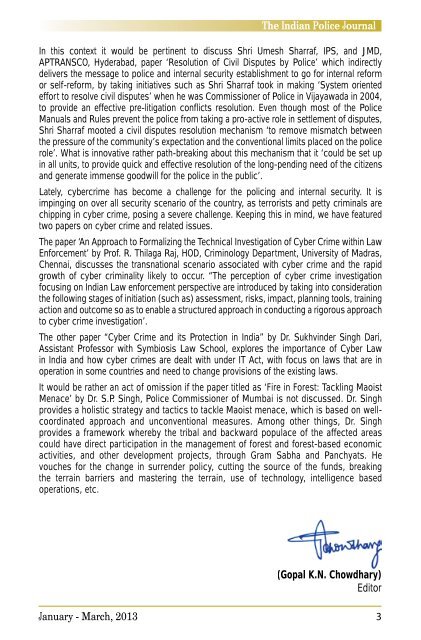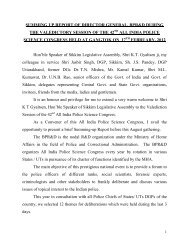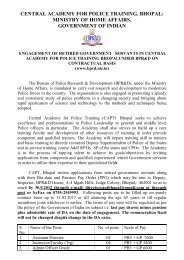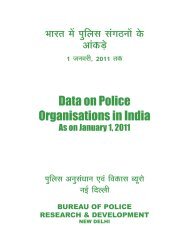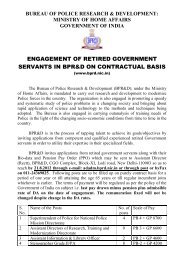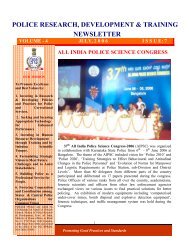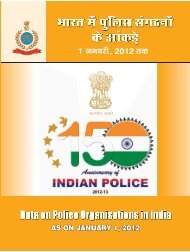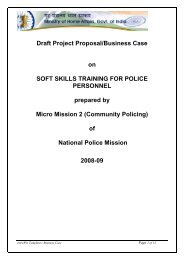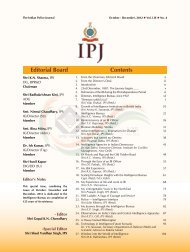by Police - Bureau of Police Research and Development
by Police - Bureau of Police Research and Development
by Police - Bureau of Police Research and Development
You also want an ePaper? Increase the reach of your titles
YUMPU automatically turns print PDFs into web optimized ePapers that Google loves.
The Indian <strong>Police</strong> JournalIn this context it would be pertinent to discuss Shri Umesh Sharraf, IPS, <strong>and</strong> JMD,APTRANSCO, Hyderabad, paper ‘Resolution <strong>of</strong> Civil Disputes <strong>by</strong> <strong>Police</strong>’ which indirectlydelivers the message to police <strong>and</strong> internal security establishment to go for internal reformor self-reform, <strong>by</strong> taking initiatives such as Shri Sharraf took in making ‘System orientedeffort to resolve civil disputes’ when he was Commissioner <strong>of</strong> <strong>Police</strong> in Vijayawada in 2004,to provide an effective pre-litigation conflicts resolution. Even though most <strong>of</strong> the <strong>Police</strong>Manuals <strong>and</strong> Rules prevent the police from taking a pro-active role in settlement <strong>of</strong> disputes,Shri Sharraf mooted a civil disputes resolution mechanism ‘to remove mismatch betweenthe pressure <strong>of</strong> the community’s expectation <strong>and</strong> the conventional limits placed on the policerole’. What is innovative rather path-breaking about this mechanism that it ‘could be set upin all units, to provide quick <strong>and</strong> effective resolution <strong>of</strong> the long-pending need <strong>of</strong> the citizens<strong>and</strong> generate immense goodwill for the police in the public’.Lately, cybercrime has become a challenge for the policing <strong>and</strong> internal security. It isimpinging on over all security scenario <strong>of</strong> the country, as terrorists <strong>and</strong> petty criminals arechipping in cyber crime, posing a severe challenge. Keeping this in mind, we have featuredtwo papers on cyber crime <strong>and</strong> related issues.The paper ‘An Approach to Formalizing the Technical Investigation <strong>of</strong> Cyber Crime within LawEnforcement’ <strong>by</strong> Pr<strong>of</strong>. R. Thilaga Raj, HOD, Criminology Department, University <strong>of</strong> Madras,Chennai, discusses the transnational scenario associated with cyber crime <strong>and</strong> the rapidgrowth <strong>of</strong> cyber criminality likely to occur. “The perception <strong>of</strong> cyber crime investigationfocusing on Indian Law enforcement perspective are introduced <strong>by</strong> taking into considerationthe following stages <strong>of</strong> initiation (such as) assessment, risks, impact, planning tools, trainingaction <strong>and</strong> outcome so as to enable a structured approach in conducting a rigorous approachto cyber crime investigation’.The other paper “Cyber Crime <strong>and</strong> its Protection in India” <strong>by</strong> Dr. Sukhvinder Singh Dari,Assistant Pr<strong>of</strong>essor with Symbiosis Law School, explores the importance <strong>of</strong> Cyber Lawin India <strong>and</strong> how cyber crimes are dealt with under IT Act, with focus on laws that are inoperation in some countries <strong>and</strong> need to change provisions <strong>of</strong> the existing laws.It would be rather an act <strong>of</strong> omission if the paper titled as ‘Fire in Forest: Tackling MaoistMenace’ <strong>by</strong> Dr. S.P. Singh, <strong>Police</strong> Commissioner <strong>of</strong> Mumbai is not discussed. Dr. Singhprovides a holistic strategy <strong>and</strong> tactics to tackle Maoist menace, which is based on wellcoordinatedapproach <strong>and</strong> unconventional measures. Among other things, Dr. Singhprovides a framework where<strong>by</strong> the tribal <strong>and</strong> backward populace <strong>of</strong> the affected areascould have direct participation in the management <strong>of</strong> forest <strong>and</strong> forest-based economicactivities, <strong>and</strong> other development projects, through Gram Sabha <strong>and</strong> Panchyats. Hevouches for the change in surrender policy, cutting the source <strong>of</strong> the funds, breakingthe terrain barriers <strong>and</strong> mastering the terrain, use <strong>of</strong> technology, intelligence basedoperations, etc.(Gopal K.N. Chowdhary)EditorJanuary - March, 20133


